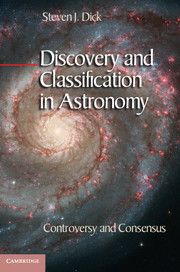Book contents
- Frontmatter
- Contents
- Preface
- Abbreviations
- Introduction The Natural History of the Heavens and the Natural History of Discovery
- Part I Entrée
- Part II Narratives of Discovery
- Part III Patterns of Discovery
- 6 The Structure of Discovery
- 7 The Varieties of Discovery
- 8 Discovery and Classification
- Part IV Drivers of Discovery
- Part V The Synthesis of Discovery
- Appendix 1 Astronomy’s Three Kingdoms
- Appendix 2 Astronomical Discoveries and Their Extended Structure
- Notes
- Select Bibliographical Essay
- Glossary of Concepts Related to Discovery
- Index
6 - The Structure of Discovery
from Part III - Patterns of Discovery
Published online by Cambridge University Press: 05 August 2013
- Frontmatter
- Contents
- Preface
- Abbreviations
- Introduction The Natural History of the Heavens and the Natural History of Discovery
- Part I Entrée
- Part II Narratives of Discovery
- Part III Patterns of Discovery
- 6 The Structure of Discovery
- 7 The Varieties of Discovery
- 8 Discovery and Classification
- Part IV Drivers of Discovery
- Part V The Synthesis of Discovery
- Appendix 1 Astronomy’s Three Kingdoms
- Appendix 2 Astronomical Discoveries and Their Extended Structure
- Notes
- Select Bibliographical Essay
- Glossary of Concepts Related to Discovery
- Index
Summary
If both observation and conceptualization, fact and assimilation to theory, are inseparably linked in discovery, then discovery is a process and must take time.
Thomas Kuhn, 1962The idea of discovery is conceptually too complex for any “average” historical, psychological, or sociological analysis. Put more controversially, settling on the meaning of “discovery” is too important to our understanding of science to be abandoned to scientific discoverers or to psychologists or to sociologists or to historians of science. Conceptual analysis is important enough to be pursued by conceptual analysts, and not just given over to fact-gatherers.
Norwood Russell Hanson, 1967Epistemologically the problem [of the nature of discovery] is insoluble from an individualistic point of view. If any discovery is to be made accessible to investigation, the social point of view must be adopted; that is, the discovery must be regarded as a social event.
Ludwik Fleck, 1935Discovery is not an atomized contribution to knowledge that others need merely recognize and accept, but rather represents a retrospective characterization of a complex process of transformative negotiation, characterization that simultaneously formalizes the essential character of the discovery and confers upon it the stamp of objectivity as, by implication, an aspect of the physical world that was there waiting to be “discovered.”
Kenneth Caneva, 2005- Type
- Chapter
- Information
- Discovery and Classification in AstronomyControversy and Consensus, pp. 173 - 200Publisher: Cambridge University PressPrint publication year: 2013



